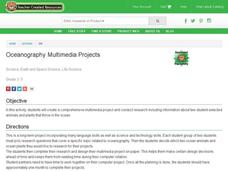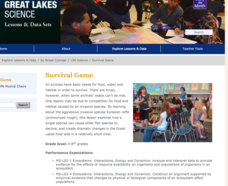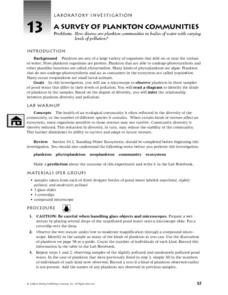Forest Foundation
Forests, Carbon & Our Climate
To conclude their examination of forest ecosystems, class members consider the role forests play in the carbon cycle and how forests can offset climate change.
Curated OER
Oceanography Multimedia Projects
Students examine marine life. In this oceanography lesson, students design a multimedia project using PowerPoint or HyperStudio that encompasses research that they do on ocean ecosystems.
American Museum of Natural History
What's This? Feeding
Some species have pretty creative methods for catching food. Young scientists learn about some interesting ways organisms get the nutrients they need by navigating an online interactive lesson that would be suitable for a remote learning...
Curated OER
Coral Reefs
Students research an inhabitant of a Caribbean coral reef using a list of common organisms that live on or near it. Students then write a description of their organism and draw a picture or a 3-D model of it. Eventually they all work...
Michigan Sea Grant
Survival Game
Musical chairs may be a classic game, but Ruffe Musical Chairs is a unique lesson on invasive species! Using the time-honored game, pupils role play the behaviors of the invasive fish called Eurasian ruffe. Learning about this aggressive...
Curated OER
A Survey of Plankton Communities
In this biology worksheet, students identify and define the vocabulary terms listed and make a prediction about the outcomes of the experiment. Then they complete the chart of the observations of the plankton diversity in drops of pond...
American Museum of Natural History
Dive Into Worlds Within the Sea
The ocean is a series of ecosystems within an ecosystem. Learners dive into an exploration of ecosystems in an interactive lesson. They identify connections between organisms by following leading prompts within the lesson. The resource...
American Museum of Natural History
What's the Big Deal About Water?
It may seem simple, but water is one of the most unique substances on Earth. An interactive online lesson describes its properties and importance in so many different situations. Learners interact with the lesson to learn the role water...
Ocean Explorer
Architects of the Coral Reef
Coral Reefs are the focus of a life science lesson plan. Upper graders look at how coral reefs are formed, how the animals and plants reproduce, and the variety of ways that humans benefit from coral reefs around the world. Groups of...
California Academy of Science
Academy Seafood Market and Fishery
What fishing method is the most sustainable? Find out through a fun, but meaningful game in which your little fishermen use different techniques to see what they catch. After the fishing activity is over, there are several discussion...
Curated OER
"Global Relations"
Students explain the difference between each of three major ecosystems. They determine the flow of water in the St. Mary's River as it flows out of the river into the bay, and finally out into the Atlantic Ocean and identify where...
Curated OER
Introduction to Ecology
Eighth graders identify the living and nonliving components of an ecosystem. In this ecology lesson, 8th graders explain the role each organism plays. They participate in class discussion and answer a quiz at the end of the lesson.
Curated OER
Discovering the Oasis
Students focus on the types of vegetation and animal life living around local water sources. This lesson can be adapted to any local water source, whether it be a lake, a river, stream or ocean. It has a particular focus on the bird...
Curated OER
Sea Scape
Pupils learn about and make models of coral reefs. In this reef ecosystem lesson, the class locates a number of coral reefs on a map. They learn how a coral reef is a balanced ecosystem that depends upon all of it's plant and animal...
Curated OER
Gray Whales on the Move
Students study whale migration and their natural history. In this migration lesson students plot whale migration on a map and describe their ecosystems.
Curated OER
Ocean Habitats:
Students investigate the creatures of intertidal zones. They explore the adaptations species make to survive .
National Geographic
Eat an Alien Invader
If you are looking for a lesson about invasive species to ocean habitats, you have arrived! Introduce the concept to learners and have them read an article about marine invasive species. Vocabulary, relevant web links, and a cute handout...
Curated OER
Under The Sea
In this resource instructional activity, learners use non-fiction books to research ocean animals. Students discover the many features of non-fiction books and how to use these features to help them conduct research. Learners then...
Curated OER
Antarctica
Students explore why Antarctica is so important to the planet. They investigate the physical characteristics. Students create their own unique treaty of governance for Antarctica and discuss how laws are enforced in Antarctica.
Curated OER
Coral Reefs: Gardens Under the Sea
Students discover the wonders of coral reefs while listening to a book about them. In a Reading Rainbow video activity, they simulate a dive, check equipment and explore a reef. Role-playing as marine biologists, students uncover...
National Wildlife Federation
Penguin Fun Facts
What's black and white and can dive up to 1,800 feet under water? That's right, penguins! Learn this and many other amazing facts about these unique birds with this handy reference sheet.
Curated OER
Exploring Marine Objects
Learners identify the sources of water on Earth. In this life science lesson, students list the different plants and animals that live in the ocean. They explore marine objects in the lab and draw them.
Curated OER
Myth-try Cards Activity
Students read creation myths to learn various cultural explanations for natural phenomena. They select sharks and write myths to explain physical structures, behaviors or roles in ecosystems. They research the animals to provide...
Curated OER
SPLASH – Monitoring Humpback Whales
Middle schoolers view a video about the humpback whale and why it is endangered. In this endangered species lesson, students recognize the importance of observing and following an endangered species in an ecosystem. Middle schoolers...

























